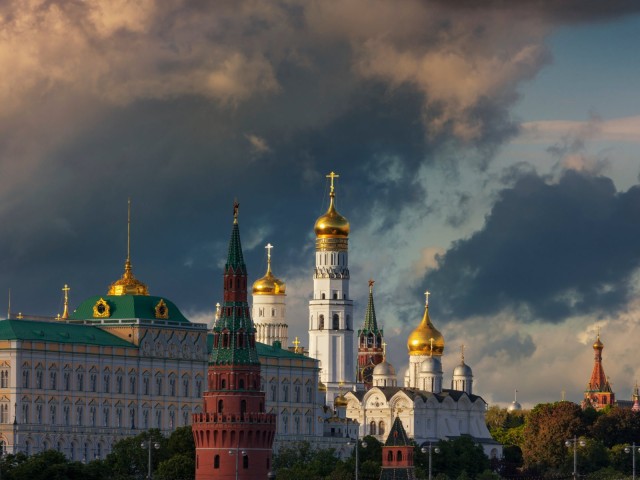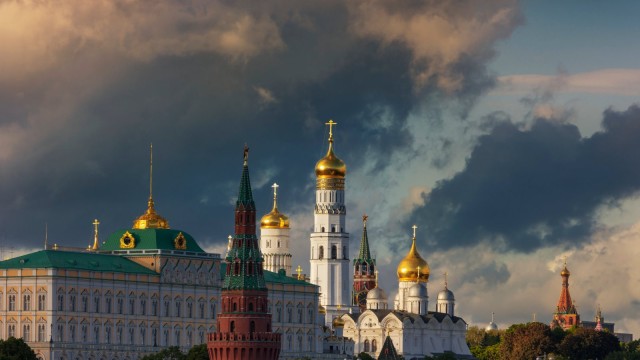May 23, 2025
Russia: the economic wheels are coming off
Why Wladimir Putin's economic miracle is faltering.


Today’s discussion will not focus on Trump’s erratic trade policies, but rather on another factor that has shifted since the change in administration: America's stance towards Russia. Trump is generally considered to be rather friendly towards Russia. As far as the war in Ukraine is concerned, the Trump team noticeably sided with Putin .
Russia’s economy faces headwinds
One might assume that the Russian economy would thus benefit from the improved relations with Washington. With a new ally in the White House, you might think there should be nothing standing in the way of continuing the surprisingly strong growth of over 4% in 2023 and 2024! Alas, you'd be mistaken! In reality, Russia’s economy is in a nosedive. A crash landing is not inevitable, but it has now become a distinct possibility.
Wherever you look: all early economic indicators are pointing south, and I don't mean the sunny resorts on the Russian Black Sea coast. Business and consumer confidence, vehicle registrations, retail sales: all are in accelerated reverse (see figures).
Russia‘s economy feels the gravitational pull
Retail Sales (in %, YoY) and Business Confidence (in %, YoY)
⬤ {series.name}: {point.y}
Vehicle registrations '000
⬤ {series.name}: {point.y}
The military-industrial complex has reached a peak
What has changed since I last discussed Russia in this column ? Just half a year ago, everything seemed to be running smoothly! Well, in addition to Russia’s inherent structural growth impediments such as dependence on the oil and gas sector, demographic decline, and widespread corruption, several cyclical factors have emerged. The years since Russia's attack on Ukraine were marked by Western sanctions and the reorientation of trade routes to the East. This required significant investments in the corresponding infrastructure, which boosted growth. This transformation is now largely complete. The same goes for the arms industry. After the massive expansion of weapons and war goods production, a plateau has now been reached. At a very high level: last year, Russia spent more than 7% of its GDP on armaments , compared to about 4% before the war of aggression. But military output now appears maxed out. Additional growth of the military-industrial complex will be much more subdued from here.
Restrictive monetary policy
Inflation has risen to over 10%, far beyond the central bank's target of 4%. This is less due to patchy sanctions leading to supply constraints, but rather to rising labor costs, as workers are becoming increasingly scarce due to military conscription, casualties and emigration. The central bank has responded robustly by raising interest rates to a dizzying 21%. This has dampened economic dynamism.
Oil prices keep falling
And now, bad luck has also struck: thanks to Trump's trade war and the expected slowdown in the global economy hitting oil demand, oil prices are dropping sharply. Last week, the price of a barrel fell below $60, the lowest level since the pandemic. A year ago, oil cost around $80. And Russia needs at least this level to balance its budget. Public debt is not Russia's core problem. But the current situation will undoubtedly lead to further erosion of Moscow’s fiscal space. Whether the economic predicament will lead to an escalation of Russia’s so-called “special military operation” in Ukraine also depends largely on Vladimir Putin's buddy in the White House. So far, his boastful peace promises have unfortunately remained unfulfilled.

Russia’s economy is in a nosedive. A crash landing is not inevitable, but it has now become a distinct possibility.
Download To the point!
-
272.5 KB | May 23, 2025
This publication is addressed exclusively at recipients in the EU, Switzerland, Liechtenstein and the United Kingdom. This report is not being distributed by LBBW to any person in the United States and LBBW does not intend to solicit any person in the United States. LBBW is under the supervision of the European Central Bank (ECB), Sonnemannstraße 22, 60314 Frankfurt/Main (Ger many) and the German Federal Financial Supervisory Authority (BaFin), Graurheindorfer Str. 108, 53117 Bonn (Ger many) / Marie-Curie-Str. 24-28, 60439 Frankfurt/Main (Germany). This publication is based on generally available sources which we are not able to verify but which we believe to be reliable. Nevertheless, we assume no liability for the accuracy and completeness of this publication. It conveys our non-binding opinion of the market and the products at the time of the editorial deadline, irrespective of any own holdings in these products. This publication does not replace individual advice. It serves only for informational purposes and should not be seen as an offer or request for a purchase or sale. For additional, more timely in-formation on concrete investment options and for individual investment advice, please contact your investment advisor. We retain the right to change the opinions expressed herein at any time and without prior notice. Moreover, we retain the right not to update this information or to stop such updates entirely without prior notice. Past performance, simulations and forecasts shown or described in this publication do not constitute a reliable indicator of future performance. The acceptance of provided research services by a securities services company can qualify as a benefit in supervisory law terms. In these cases LBBW assumes that the benefit is intended to improve the quality of the relevant service for the customer of the benefit recipient. Additional Disclaimer for recipients in the United Kingdom: Authorised and regulated by the European Central Bank (ECB), Sonnemannstraße 22, 60314 Frankfurt/Main (Germany) and the German Federal Financial Supervisory Authority (BaFin), Graurheindorfer Str. 108, 53117 Bonn (Germany) / Marie-Curie-Str. 24-28, 60439 Frankfurt/Main (Germany). Deemed authorised by the Prudential Regulation Authority. Subject to regulation by the Financial Conduct Authority and limited regulation by the Prudential Regulation Authority. Details of the Temporary Permissions Regime, which allows EEA-based firms to operate in the UK for a limited period while seeking full authorisation, are available on the Financial Conduct Authority’s website.



